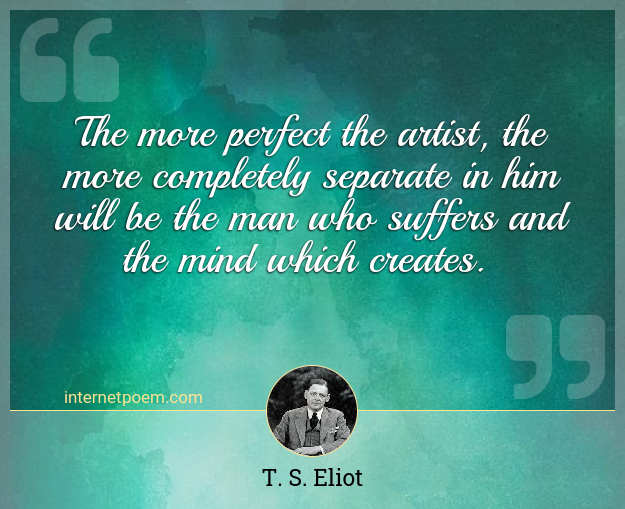Introduction: Eliot argues in this essay that there is
a difference between a poet's personality and his art, and that great poetry
exists in a kind of dialogue with the tradition of poetry, which, for Eliot,
means the European tradition. When the author write something, it’s not him.
It’s just an idea and creativity what he feeding in is mind.
Description: His essay is divided into three parts:
In part one, Eliot articulates
his notion of literary tradition. Eliot argues that often what marks great
poetry is the degree to which it is able to evoke the poets of the past most
"vigorously." His point isn't that great poetry should simply imitate
poetry of the past, but that it should exist in awareness of the "whole of
the literature of Europe" as its context. In this sense, the meaning of a
poem is never created solely by the author; its significance comes from the
author's "appreciation" of his relationship to the tradition. In this
sense, Eliot claims that the life of an artist is "continual self
sacrifice, a continual extinction of personality."
In part two, Eliot focuses on
the poetic practices this position requires. He argues that the mature poet
writes not because he has "more to say" but because his technique has
made it possible for him to more finely articulate emotion. He explains this
using an analogy from chemistry: how platinum, in the presence of oxygen and
sulfur dioxide, acts as a catalyst to create sulphurous acid. The poet is akin
to the platinum: through the practice of his art, new work is brought into
being, but the poet himself, personally, is unchanged. In this regard, Eliot
makes a distinction between "emotion" and "feeling." The
poetic mind is a receptacle for recording feelings, which the poetic process
turns into "emotion." Eliot uses several examples, of which Dante is key; Dante's poetry achieves
greatness not through the intensity of its emotion but the intensity of the
"artistic process," which is to use new combinations of feelings to
evoke in new ways the universal emotions that form the basis of literary
tradition.
Part three is short conclusion.
Here, Eliot recapitulates his argument: that "the emotion of art is
impersonal," and the work of the artist is articulate feeling within the
context of the living literary tradition of Europe.
Conclusion: The fact that critics find
biographical interests dismaying is easily explained. It is still an article of
a critic's faith that, as T. S. Eliot wrote 64 years ago, ''the more perfect
the artist, the more completely separate in him will be the man who suffers and
the mind which creates; the more perfectly will the mind digest and transmute
the passions which are its material.'' Critics have taken Eliot's word on this
matter and acted on the understanding that criticism is one thing and biography
a diversion from the only thing that counts, the work, the words on the page.



0 Comments